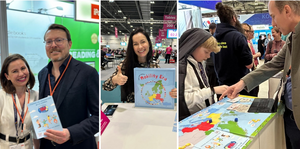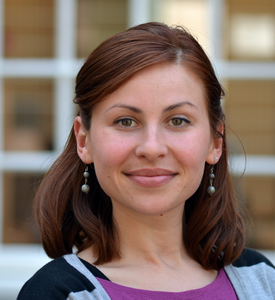UNU-MERIT affiliated researcher nominated for thesis-based educational game
In 2016, Irina Burlacu de Paoli (UNU-MERIT PhD alumna and external lecturer at Maastricht University’s Summer Programme in European Studies) created the Mobility Era Game, a research-based financial literacy board game. In the same year, she also founded Researchista, a platform that helps package research findings into creative, tangible learning tools.
The Mobility Era Game is currently the number-one educational game in Europe in the field of financial and fiscal literacy. It is featured on the European Commission’s TaxEdu portal and is used by educators and students in over 40 countries.
We’re proud to share that Burlacu de Paoli is now one of the finalists for the Triple E Awards, which are a global recognition of efforts towards entrepreneurship and engagement in higher education.
🗳️ To vote for her submission (‘Transform the “Ivory Tower” with Educational Gaming!’) to win the Community Engagement Initiative of the Year Award, click here!
Below, Burlacu de Paoli answers our questions about how the Mobility Era Game works, the process of its creation and its positive impact on society thus far.
What made you interested in using gamification as a tool to communicate your research?
Gamification was not very much used back in 2016 [when I began creating this game]. I wanted to show how many valuable things we can learn from PhD theses and create something tangible – and a game speaks to anyone who counts and reads. I also wanted to inspire researchers to avoid depression, anxiety and low self-esteem by channeling their time and energy into something creative that can be of use to other people, and to start Researchista as a catalyst for supporting the creation of fun educational tools from research outcomes.
What does a player learn through playing your game?
If I start telling someone about the latest important fiscal reforms, I might lose their attention within the first minute of our conversation. Hence, the game is not particularly focused on different types of taxes and other heavy topics; rather, public finance is blended into the game in a fun and non-invasive way.
By playing the Mobility Era Game, a player puts his/her life into perspective. Each year is a square on the board, bringing challenges and bouts of luck, travels to different countries for work, salaries and taxes. As we advance, we need money to have an easier life. Yet, in playing the game, one gets to remember that no matter how stressful, expensive and bureaucratic daily life might be, it is health and happiness (along with other social factors) that propel our lives forward.
What changes has your game affected on policymakers and/or others in the academic community?
Due to its multidimensionality, the Mobility Era Game has multiple partnerships and communications in a variety of fields, including financial entities such as banks, finance ministries, tax inspectorates, national committees and accountants; schools and universities; and other interested parties. Although we are only a startup, we believe we have made a policy impact at the EU level. If EU national financial institutions know about the game and use it for communications, for us this is impactful.
In the European edition, the game maps more than 40 countries, showing official statistics on personal income taxes and average tax income. If someone needs a quick comparative overview of these countries, they can choose between collecting EUROSTAT, OECD and national statistics – or playing one round of the Mobility Era Game.
Jokes aside, the app-version of our game includes a larger scale of detail and statistics, which comes in very handy, be that for corporate communication (such as large multinationals that wish to keep their beneficiaries or employees aligned to the same stats) or classical institutional use.
We are currently the only game (physical and app) on the portal of the European Commission on fiscal education, TaxEdu – a portal we highly recommend to parents, teachers and anyone else due to its playful and easy-to-understand learning tools on complex public finance topics.
Academia meanwhile needs and wants broader communication and exposure, and there is a lot of effort done in this direction, but it is very hard to commercialize educational products, and those that are more complex need an even-longer “brewing” time.
In what circumstances would you encourage someone else to use a game to communicate his/her research?
In all circumstances!
When it comes to games and the type of games to use for research communication in particular, I would always advise people to familiarize themselves with the latest updates in educational technologies and do some business courses in the meantime. These might come in handy when you decide to scale up. But also let your imagination flow. Don’t worry about what shape an idea takes – your intention behind it and its message to the world is what matters.
ANY COMMENTS?
NOTA BENE
The opinions expressed here do not necessarily reflect the views of UNU.
MEDIA CREDITS
Photos by Dr Burlacu de Paoli and H. Pijpers / UNU-MERIT | Maastricht University





